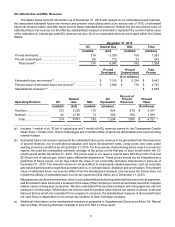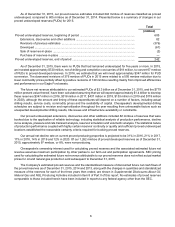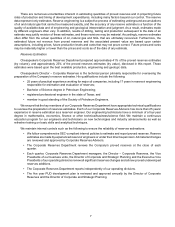Chesapeake Energy 2015 Annual Report Download - page 18
Download and view the complete annual report
Please find page 18 of the 2015 Chesapeake Energy annual report below. You can navigate through the pages in the report by either clicking on the pages listed below, or by using the keyword search tool below to find specific information within the annual report.14
Regulation – Environment, Health and Safety
Our operations are subject to stringent and complex federal, state and local laws and regulations relating to the
protection of human health and safety, the environment and natural resources. These laws and regulations can restrict
or impact our business activities in many ways, such as:
• requiring the installation of pollution-control equipment or otherwise restricting the way we can handle or
dispose of wastes and other substances associated with operations;
• limiting or prohibiting construction activities in sensitive areas, such as wetlands, coastal regions or areas
that contain endangered or threatened species and/or species of special statewide concern or their habitats;
• requiring investigatory and remedial actions to address pollution caused by our operations or attributable to
former operations;
• requiring noise, lighting, visual impact, odor and/or dust mitigation, setbacks, landscaping, fencing, and other
measures;
• restricting access to certain equipment or areas to a limited set of employees or contractors who have proper
certification or permits to conduct work (e.g., confined space entry and process safety maintenance
requirements); and
• restricting or even prohibiting water use based upon availability, impacts or other factors.
Failure to comply with these laws and regulations may trigger a variety of administrative, civil and criminal
enforcement measures, including the assessment of monetary penalties, the imposition of remedial or restoration
obligations, and the issuance of orders enjoining future operations or imposing additional compliance requirements.
Certain environmental statutes impose strict, joint and several liability for costs required to clean up and restore sites
where hazardous substances, hydrocarbons or wastes have been disposed or otherwise released. Moreover, local
restrictions, such as state or local moratoria, city ordinances, zoning laws and traffic regulations, may restrict or prohibit
the execution of our drilling and production plans. In addition, third parties, such as neighboring landowners, may file
claims alleging property damage, nuisance or personal injury arising from our operations or from the release of
hazardous substances, hydrocarbons or other waste products into the environment.
The trend in environmental regulation is to place more restrictions and limitations on activities that may affect the
environment. We monitor developments at the federal, state and local levels to inform our actions pertaining to future
regulatory requirements that might be imposed to mitigate the costs of compliance with any such requirements. We
also participate in industry groups that help formulate recommendations for addressing existing or future regulations
and that share best practices and lessons learned in relation to pollution prevention and incident investigations.
Below is a discussion of the major environmental, health and safety laws and regulations that relate to our business.
We believe that we are in material compliance with these laws and regulations. We do not believe that compliance
with existing environmental, health and safety laws or regulations will have a material adverse effect on our financial
condition, results of operations or cash flow. At this point, however, we cannot reasonably predict what applicable laws,
regulations or guidance may eventually be adopted with respect to our operations or the ultimate cost to comply with
such requirements.
Hazardous Substances and Waste
Federal and state laws, in particular the federal Resource Conservation and Recovery Act (RCRA) regulate
hazardous and non-hazardous wastes. In the course of our operations, we generate petroleum hydrocarbon wastes,
such as drill cuttings, produced water and ordinary industrial wastes. Under a longstanding legal framework, certain
of these wastes are not subject to federal regulations governing hazardous wastes, although they are regulated under
other federal and state waste laws. At various times in the past, proposals have been made to amend RCRA to eliminate
the exemption applicable to crude oil and natural gas exploration and production wastes. Repeal or modifications of
this exemption by administrative, legislative or judicial process, or through changes in applicable state statutes, would
increase the volume of hazardous waste we are required to manage and dispose of and would cause us, as well as
our competitors, to incur increased operating expenses.
Federal, state and local laws may also require us to remove or remediate wastes or hazardous substances that
have been previously disposed of or released into the environment. This can include removing or remediating wastes
or hazardous substances disposed of or released by us (or prior owners or operators) in accordance with then current
laws, suspending or ceasing operations at contaminated areas, or performing remedial well plugging operations or
























